Link:
https://dannyman.toldme.com/2025/11/01/2025-10/
Rolling Stops
I was browsing my recent Reddit history and got to this comment about “rolling stops” and I am going to stand by this:
I roll stop signs on my bicycle, for this very reason. (Reasons: stop signs are placed with cars in mind instead of bicycles, it takes a lot of energy to start from a full stop instead of coasting near zero, and bicyclists have excellent visibility.) What happens in Sunnyvale though is a driver sees a bicycle coming to a stop sign and they go full panic and try to yield to me. I come to a complete stop and have to wait as they signal frantically from behind heavily tinted windows. I check my watch. I take a sip of water. If nobody has honked at them I yell “please go already you have the right of way its the law” &c. Then I continue on my way.
The best drivers take their turn. I don’t really care if they come to a full stop or not. Slow way down and check behind your a pillars and make sure there is nobody in your path. Bicycles have no a pillars, just tired meat motors trying to get somewhere on a hot day.
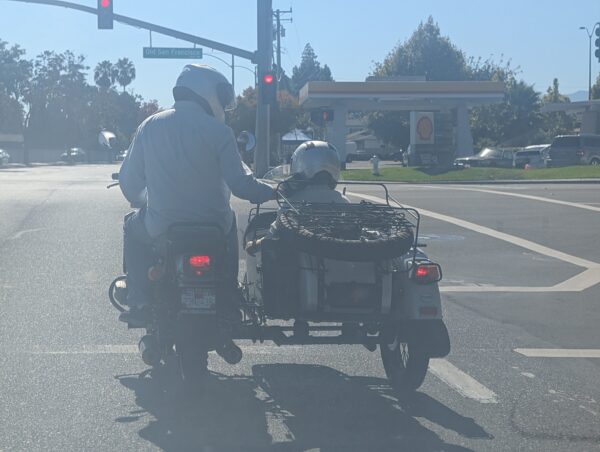
Waiting for the light
My Favorite Notebook
My favorite notebook. I found it in a book shop in Mountain View, near the turn of the century. It was small, like 4×6 or 5×7. The pages were a bit thicker than normal writing paper, suitable for sketching. It was spiral bound, so could lay flat and even flip open all the way. And the cover was rubber, maybe 3 millimeters. It was small and durable and good for taking whatever written or sketched idea came to mind. A wonderful companion to have at hand, especially for a guy whose daily wear at the time included cargo shorts.
Sometimes I contemplate The Best Tool for capturing thoughts. The modern smart phone is always at hand but the interface is optimized for consumption over expression. A paper notebook is less universally at hand, but that rugged little bugger with the thick pages that could lie flat . . . I still remember that one fondly.
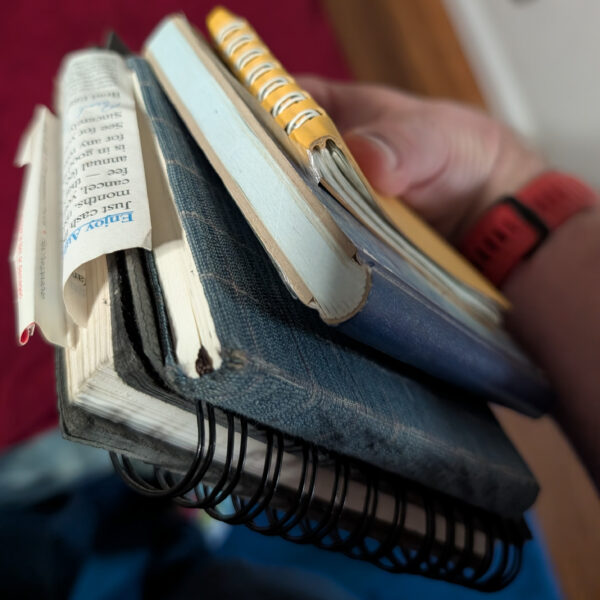
Old traveling companions
Monuments of Past Hatred
I caught the tail end of a talk with Jelani Cobb at City Arts & Lectures on KQED. He described a museum in Russia that features Nazi artifacts. Because of what they represent and the blood price paid to acquire them, they are displayed on the floor. He suggested this as a good strategy for Confederate monuments. We should display them to remember history, but pull them off their pedestals and leave them lying in the mud. “Here’s a monument to that war that you lost.”
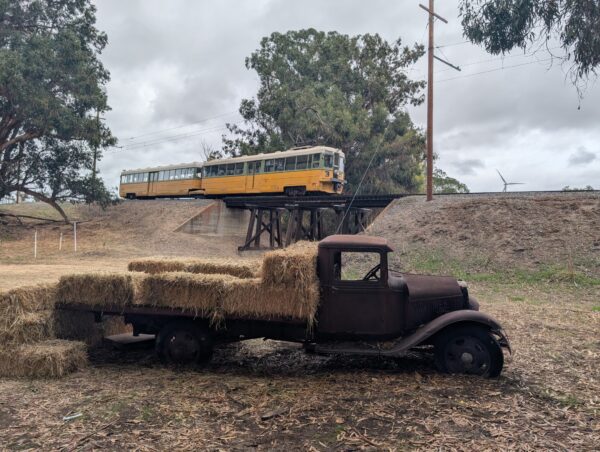
Remembering the Past
NPR Claims Anti-Fascism is a “Far-Left Ideology”
Earlier this month, President Trump welcomed right-wing influencers to the White House for a roundtable about antifa, the far-left movement or ideology opposed to fascism.
—Ryan Lucas, NPR

Far-Left Ideologues on Foreign Soil
21 Monkeys
Via https://www.wapt.com/article/monkeys-on-the-loose-near-heidelberg-mississippi/69181629:
All but one of the rhesus monkeys that escaped from an overturned truck in Jasper County were euthanized, according to officials. “We are continuing to look for the one monkey that is still on the loose. The monkey that got away actually crossed interstate, went out into a wooded area.”
The monkeys, weighing approximately 40 pounds each, are aggressive toward humans and require personal protective equipment to handle.
The Jasper County Sheriff’s Office originally said the monkeys carried hepatitis C, herpes and COVID. Tulane officials stressed that the animals were not diseased or infectious.
I am sure those monkeys have good reasons for being aggressive towards humans and I am rooting for the one that got away to find a nice place to hole up safe.

We are all diseased monkeys desperate to escape
Feedback Welcome
Link:
https://dannyman.toldme.com/2025/02/01/2025-01/
2024-05-18 Saturday
The Modern People came here from across the sea. Where they come from, they had been punished for what they believe. They say this land has been promised to them by God, and that they and their children will settle themselves all across the fertile parts of the land.
But we live here, as our ancestors did. What of us?
The Modern People say we should sign The Treaty. We will leave the places where we live now, the lands our ancestors knew, and we will be given an area of less fertile land. The Modern People say that we can live in our own ways and make our own laws in our own new land. They say they will protect our right to live there, just as they protect their right to live in their new land. They say that they will look after us. We will have enough food. They will share their Modern Medicine. If our children wish, they may even learn the Modern ways themselves.
Our children and their children will have less than their ancestors had. They will lose the lands our ancestors knew. They will need to rely on the The Modern People who took away the land in the first place. They will need to trust these Modern People not to take more. And more. And more.
But our people will still be alive. We will still be us. What choice do we have? If we do not sign The Treaty, there will be War. A War we will not survive.
2024-05-22 Wednesday
Lt. ________,
I am contacting you on the advice of ________. I was voicing concern regarding a neighbor who, as an act of protest against the bike lane in front of his house at ________, deliberately blocks the bike lane with his waste bins. Pickup day is Tuesday, so starting on Monday night, he’ll place the bins in the middle of the bike lane.
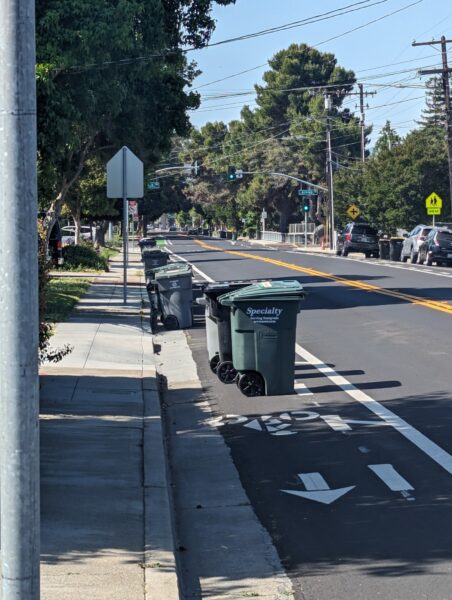
I see no harm if someone wants to protest the system. In this case, one house is forcing cyclists to merge into traffic on a bus route approaching an elementary school. There’s plenty of danger. Often, when I pass his house, I pull his bins to the curb as a courtesy.
Yesterday, he came out of his house and started yelling at me not to touch his bins. I explained that blocking the lane was dangerous and that he could be sued for injury. He yelled insults and vowed to move the bins back to the middle of the lane.
I called Public Safety, but they seemed a bit confused. The desk officer said it is illegal to park a car in a bike lane, but bins? I suggested that deliberately obstructing a roadway and endangering public safety might be a situation that could be resolved by a calm discussion with a uniformed officer. I later learned that CVC 21211(b) covers this situation.
This afternoon, around 3 pm, I saw that he was using yard work as a rationale to place his yard waste bin in the middle of the bike lane. I respect his tenacity. However, if someone from Public Safety could convince him to facilitate a safe roadway, we would all be better off.

Thank you for hearing me out. I can be reached at ________ if you have any questions.
-danny
2025-01-27 Monday
May was a long time ago. I am amazed at people who have the tenacity to stick with the same hobby year after year, decade after decade. I tend to rotate around my interests. What is new becomes old, then gets set aside, and later becomes new again. The Blog is a thing like that. Is it new again? We will see.
My informal goal for the year is to get an ADU built in the back yard. I spoke with cotta.ge last May, and they suggested a good price that I don’t entirely believe, but it gave us a little confidence.
But it is also a huge project: financing, architect, general contractor! And while the ADU rules in Sunnyvale are permissive, they also prohibit short-term rentals, so the initial concept of a guest suite for relatives and others doesn’t work. Also, our lot is on the small side, so we would likely want an attached ADU. At that point, the project becomes one of adding some space to the house while also building an ADU: the ADU gives us more flexibility in expanding our house in exchange for providing a badly-needed housing unit! Back-of-the-envelope is the high rents around here should cover the high construction costs around here, so with any luck we could add a home office / guest room for family “for free” in exchange for becoming reasonable landlords to hopefully reasonable tenants.
I need to sustain the energy to measure and sketch something out and pick up a book on home improvements. I have a vision I just need to find some follow through.
Oh, here’s a test, by the way … I upgraded this blog’s OS and PHP so now I wonder if I can upload pictures without first reducing their size.
Maximum upload file size: 2 MB.
Buhhh, will need to work on that, yet!
. . .
Fix DNS on an Ubuntu VM that was originally built in 2016 … edit /etc/php/8.3/apache2/php.ini and finally systemctl restart systemd-resolved and …
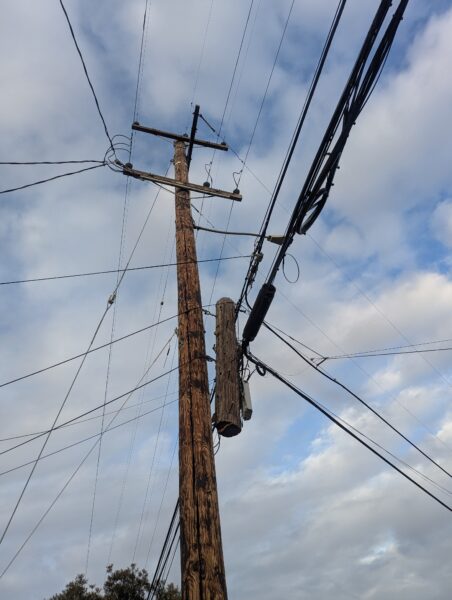
Infrastructure: always a work in progress!
Feedback Welcome
Link:
https://dannyman.toldme.com/2020/01/29/stand-down-the-army-resilience-is-our-new-national-defense/
Thoughts during this morning’s commute.
The first thought was we should disband the standing Army. We don’t need one. A Navy, airpower, some Marines and special forces? Sure. We have a National Guard to respond to domestic emergencies. We probably want to maintain and modernize equipment in case we need a war. States can form militias if they like. We can find a lot of Americans who are fond of guns on short notice. If you want to carry a firearm, you get government training, and you’re eligible for the draft.
“Standing armies are dangerous to liberty.†–Alexander Hamilton
You can’t do it all at once. Closing bases and shutting off defense contractors retards economic activity. Twenty years. Spread money around impacted communities.
But what should the government be doing?
Defense wise, we need to focus on Information Security, and, for the main part, climate change and emergency preparedness. The enemy will not land on our shores and defeat us with missiles. They’ll hack our elections and take our power grid hostage. Between the threat of information warfare and climate change, we need resilient logistics. If all the computers crash tomorrow, can we get food between communities? Where does our military-industrial complex go? Logistics.
Rural communities ought to be able to assemble and maintain their own damn tractors and combine harvesters. Right now John Deere tells farmers they can’t fix their own equipment. The government could sponsor Open Source farm equipment and software. Every county ought to be able to assemble, maintain, and carry out most repairs on its farm equipment. Every region ought to have the capacity to build tractors and vehicles, end-to-end.
The US Army is not going to save the world from the threats it faces in this century. American leadership in finding ways to restore the atmosphere to health, while modeling how we can build resilient local communities is what needs to happen.
Feedback Welcome
Link:
https://dannyman.toldme.com/2018/12/03/computer-translation/
Back in the 60s, they built a computer to translate between Russian and English. They had a big party to celebrate the first time they booted up the computer, but they had a problem of testing it since nobody was around who spoke Russian. One of the Computer Scientists proposed that they simply feed in an English phrase, translate to Russian, then translate back to English.
They fed in the English phrase: THE SPIRIT IS STRONG BUT THE FLESH IS WEAK
The computer whirred and clicked and spat out the translation.
They keyed the Russian translation back into the computer, which whirred and clicked.
The computer finished its translation: THE VODKA IS GOOD BUT THE MEAT IS ROTTEN
Feedback Welcome
Link:
https://dannyman.toldme.com/2017/07/06/fare-thee-well-mikeya/
Back in the 90s I bought a modem off a guy in California. In those days if you bought something from a guy on the Internet it was a leap of faith that you’d send off a check and get what you expected in return. Well, I sent this guy my money and he sent off the modem and the next day he sent this apology that he had forgotten to pack the power brick, which he had sent off in a separate package. No sweat. The modem showed up at my house a week later.
But the power brick … well, we kept up correspondence but it never showed up until a couple months later the guy said it had arrived back at his house without explanation, covered in mysterious markings from the Post Office, so he packed the mystery package into a bigger box and mailed that off to Illinois and it showed up a few days later and I had a working modem.
In those days I was in college, and when I got tired of school I worked at an ISP, and when I got tired of working I finally finished school. One of my hobbies was keeping an, ahem, online journal. I would have my fairly banal young guy adventures and sometimes when I couldn’t sleep or just needed to talk about things I would write things up in my, ahem, online journal. In those days, the universe of people you knew and the universe of people who read your online journal would barely overlap. There was a certain anonymous freedom, but whatever.
After I paid for my modem, it became the pattern that when I would post another update online, some hours or days later I would get a long rambling email from this dude in California, who was excited to read what I was up to, and he’d tell me about his own adventures, some from his youth … he once had a girl who smelled like cardboard, which he never could figure out … or more often about how he had just biked down to Pismo Beach with his wife Dana.
I had a fan.
And for years, whenever I would post about my life, this guy would write me back, with his own stories.
As my school wound down I got an interview in the San Francisco area, at a start-up. The start-up flew me out and after the interview, the co-founder drove me up to Pinole so I could crash at MikeyA’s place. I finally met the man. Mike Austin. I slept on his couch. He took me over to Fisherman’s Wharf, where I impressed him by eating a second dinner. He drove me around Pinole and San Pablo, showing me his spots and his friends, the liquor store where he sometimes worked.
He put me up another time, years later, on my second move to California, that time with a new wife.
He was a former cop, who worked odd jobs: liquor store, truck driver, but mostly it seemed he was having his own adventures, touring the States on his Harley, or small adventures close to home with innumerable friends. He told me a lot of guys had taken turns sleeping at his place. A lot of cop friends, who had been thrown out of the house by their wives. He is that kind of guy.
I was impressed by his ZZ Top style beard. The story he told me, and I prefer to believe it, is that he’d shave it down once a year but it always grew right back in proud and long. So it goes.
Another time he told me about how he upset his doctor. He went in for a regular checkup but his labs came back off the charts for diabetes. They drew another set of labs and he was normal. What? Well, what did you eat before the first visit? This, that, and two liters of Mountain Dew … his doctor delivered a lecture on how one should not drink two liters of Mountain Dew at lunch … or ever.
Anyway, MikeyA, Mike Austin, my Number One Fan, well, he passed away last week. In his sleep. At 65 years of age. These are hard times for his wife, Dana, no doubt. I’m going to miss the guy, too. I don’t tell rambling stories about my life on the Internet these days, and it has been a while since I got a good rambling email from Mike. I’ll still have the occasional late-night heart-to-heart with the Internet. No more emails from MikeyA, though.
Anyway, I thought I would “remember” him in the way I knew him. By just writing up some thoughts and sharing them here, with you, and with Mikey. If there is an afterlife, I assume he’s read this by now. I miss you, Mike!
Feedback Welcome
Link:
https://dannyman.toldme.com/2015/12/08/trump/
https://twitter.com/saladinahmed/status/674044184672776192
Sometimes an image is worth far more than a mere thousand words.
Even the milquetoast is calling him out:
Feedback Welcome
Link:
https://dannyman.toldme.com/2015/09/22/around-the-bend/
Life has been busy lately. I have failed at carving out time for the little things like keeping up with email and reading and writing. One theme that is just below the surface these days, is an understanding of the Individual’s impermanence, that one will inevitably be swept away down the river. But, the good news is, it is the river that is the thing. You stick your foot in the river, and you feel the tug of the currents: this one fast and warm, that one slow and cool. In life, we are these currents, flowing together, mingling, becoming something identifiable and satisfying while also becoming the river itself.
Death has been on my mind lately. Dad passed about a year back, and the Reaper has expressed an interest in the health of another loved one. I am not opposed to Death. We’re all going to get there. Life, the abused cliché reminds us, is the journey and not the destination. I’ll be forty in January. One can read that as the half way mark. I want to pull over and look around. Close at hand, I see my toddler Son, his eyes wide with the possibilities and joys of life, his future for him to know and hopefully to share with his old man. And, not far off, I see my Father, whom my Son will ever know through stories, mainly told by me. Stories I mainly lack. And, yonder still, my own Grandfather, whom I know mainly through the most exaggerated of stories.
We all come from somewhere, and we are all headed somewhere. This bend in the River knows only a short ways upstream, toward the various and contradictory legends of the Wellsprings, and only a short ways ahead, toward the various legends of the Delta, where we believe the River as we have ever understood it will cease as it merges with the Great Ocean.
The August issue of The Sun Magazine brought with it an interview with Stephen Jenkinson, whom some call “The Death Whisperer” … he packs a lot of great ideas that resonate with me into eight pages. Not bad. What follows is a bit of perspective on the idea of one’s influences.
Hoffner: Who would you say are your influences?
Jenkinson: Anyone who claims to know his or her influences probably doesn’t. I think our influences are a lot subtler than we think. For example, I was born nine years after the closing of Auschwitz and the bombing of Hiroshima half a world away. When those soldiers came home from World War II suffering from post-traumatic stress disorder before we had a name for it, North America created the suburbs for them. I grew up in the unacknowledged presence of those wartime horrors: Auschwitz on the one side, Hiroshima on the other, and the suburbs in the middle. That’s an influence on me.
As a child I was read to every night. Before I even understood the words, I was carried along by the momentum of the human voice. The pageant of the story has its way with you, even if its not in a language you can comprehend. Story is a sublime practice that makes us recognizable to ourselves.
These days I admire the songwriter Leonard Cohen, my countryman and a polestar in the firmament for anyone who has faith in human eloquence. Eloquence is a conjuring; it’s magic, and Cohen is a servant as well as a practitioner and a repository of that magic. He’s a patron saint of the Orphan Wisdom School, unawares. I don’t know what kind of life he lives, but it’s inconceivable to me that those songs might come from a duplicitous nature. In a country that appreciated its artists, he would be a national treasure and wouldn’t have to work five minutes in his life unless he was so inclined. As it is he’s been on the road for years trying to make back all the money his manager stole from him.
I met another of my influences at Harvard. As a young man I was on fire with learning about the historical Jesus. I didn’t come from a religious background, but I applied to Harvard Divinity School and got in. I was determined to be a preacher of some sort. I don’t know what else you could do with that kind of education. At the divinity school I met a fellow who was the living incarnation of a stereotypical televangelist: power-blue suit that didn’t fit so good: too-tight white shirt that was popping its buttons. He was in charge that year of vocational counsel. I told him I planned to get a master of divinity and become a pastor or a minister. He asked me the name of my sponsoring congregation, and I said I hadn’t worked that out yet. Then he asked my denominational affiliation. I told him I didn’t have one. “Son, where do you go to church?” he asked. I said that I didn’t, and he asked, “Well, where did you go to church, then?” No answer. So he said, “Let me understand this: you propose to go into the ministry, and you’ve never been to church?” “Yes sir,” I replied. “Well, I nev-uh,” he said, just like that. I was three questions into my vocational interview, and I was done.
My career as a preacher came to an end at that moment. I was counseled to register for a master of theological studies — a layperson’s degree — instead. That same week I met a preaching instructor whose name was Hugh Morgan Hill, but everyone knew him as Brother Blue. He was a vibrant speaker in the African American tradition. He said I should be in his class. I told him I’d already been counseled out of the master of divinity program. “Nobody needs to know,” he said. On my way to his first class I picked up a harmonica. The class had already begun when I got there, and Professor Hill was in full flight. He was a great storyteller and performer. For some reason I started to play my harmonica along with what he was doing, just improvising.
The next week his wife phoned and asked if I’d come with him to a church service — and bring my harmonica.
I performed with Hill on and off for seven years. It was an unofficial apprenticeship. We traveled all over the U.S. and Canada. This was the era of school integration, remember, and there were race riots in some cities, but since we were together, we were OK. He was a holy man from the ghettos of the American heartland. Virtually everything he did in the world was self-initiated. He never seemed to have a job description. He carved it out every time he stood up to speak. I learned from him the importance of proceeding without the green light, the red carpet, the Get Out of Jail Free card. I was emboldened by his example when I was working in palliative care, because I realized that if I was going to serve these dying people well, then I couldn’t wait for anyone to ask me to do it. And if I’m going to serve the era I’ve been born into well, then I can’t wait for approval and recognition. I’m going to have to proceed without it. If it comes, it comes; if it doesn’t, it doesn’t. That, and a lot more, is what I got from him.
Brother Stephen articulates a lot of ideas about Life and Death. Ideas I am still digesting. But I suppose I can share some notes.
To be Alive is to be In Debt to Death. Everything we have, everything … the food we eat day after day, the clothes we wear, the fuel we use to get around … animals and plants, and if you think about it, the Solar energy that fuels All Of It comes from the slow annihilation of the Sun, as its atoms fuse into ever heavier elements. “What will your death feed?”
The Debt is non-negotiable and it will be re-paid.
“Grief is not sadness. There’s sadness in grief, but grief is not exhausted when the sadness goes away. … Sadness has a shelf life, but grief endures …” I picture a small pot, held over the flame of death. The sadness bubbles and splatters and evaporates. The pot is withdrawn from the flame. There is a residue left over. That residue is grief. It does not boil away. You paint with it. You leave a mark somewhere so that when one needs a reminder that “this too shall pass” they may thus be reminded. This paragraph is painted with grief. I hope it feeds your wisdom.
In the interview, Jenkins has a riff about the need for an element missing in our culture: the Rite of Passage in which childhood ends and adulthood begins. A consumer culture derives better profits from a population that is not asked to Grow Up: You Deserve More and More!! His critique resonates but I disagree with the idea that a Rite must “kill off childhood” … on the very next page he explains that it is misguided to shelter children from the idea of death … I think that Childhood is maybe what lends Death its greatest contrast. Young and full of possibility and very self-involved … adults should not be so self-involved, the grown ups must labor to pay the interest on our life debt … but we still need to grow and learn. While we would prefer for grownups to not be self-involved narcissists we need also ask them to be sufficiently self-involved, and other involved, to cultivate their self awareness.
Other involved is what we ask of a child, and what we give a child, when we share with them the fact of Death. Children can appreciate Wisdoms, just as Adults can appreciate Wonders.
A last thought, while I sat in my favorite coffee shop, taking and making these notes, and watching an Old Man drink in the Joyful Clown Antics of some toddlers across the way, was that nursing homes really ought to co-locate with nurseries. Children bring Life into the Room. Elders bring Life as well. The children are starting from scratch, painting with incoherent vitality. The elders have taken their lives, chipped away at it, and produced works of art, called Lives. Day by day, they reveal these works to the children: some are beautiful, some are perplexing, some are sad, and some are horrible. The children react, embrace, reject, imitate, and iterate. Culture ensues, and the river flows enriched.
Feedback Welcome
Link:
https://dannyman.toldme.com/2014/05/09/elevated-trains/
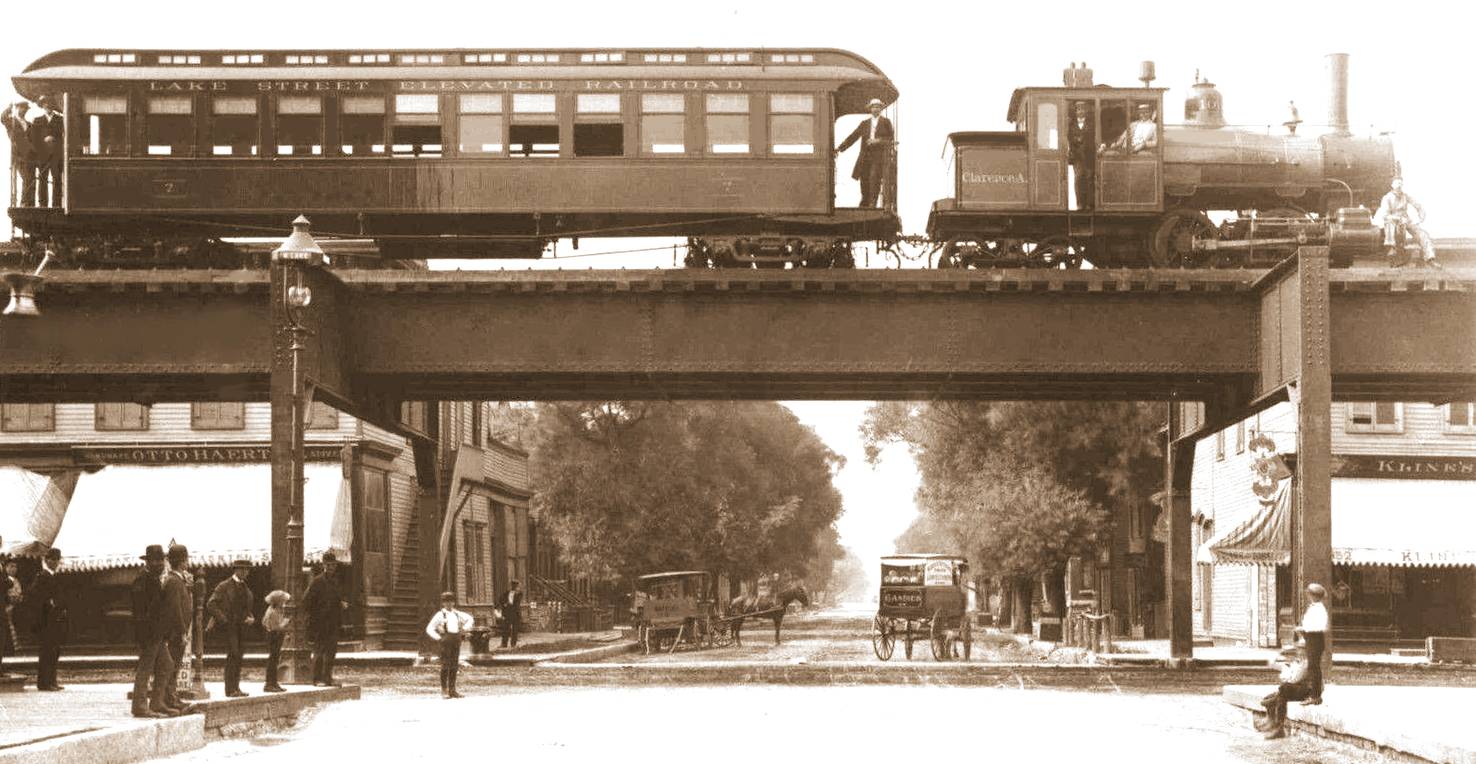
Forney engine pulls Lake Street Elevated Railroad train over Lake Street in Chicago, 1893.
Thanks, Chuckman!!
Feedback Welcome
Link:
https://dannyman.toldme.com/2014/02/22/bookmark-spring-day/
Early to bed, Thursday night. Tommy sleeps through the nights for the most part but this morning at 4:30am he had the hunger. Daddy offered formula, but Tommy didn’t want formula. Daddy set him back in the crib, and Tommy cried. Daddy offered formula again. 2oz down, Tommy cries as Daddy fixes more. 4oz down, then Tommy cries as Daddy fixes more. Another 4oz nearly down and Tommy urps a fountain of undigested formula all over himself and Daddy’s bathrobe. Mommy offers to nurse, and before long mother and son have dozed off together. But Daddy can’t sleep, and so it is off to the coffee shop for a bit of research, then off to work . . .
. . . home a bit early from work, Daddy is beat but can’t settle into a nap. Mommy has an evening shift, so Daddy picks his son up from day care. Smiles. Joy. Upon returning home, the boy is strapped to Daddy’s chest for a pleasant evening stroll as the sun sets, with a soft musical accompaniment from Daddy’s mobile phone. Daddy sings softly to his boy, and Tommy smiles at the mujeres strolling around the park, and can not take his eyes off the lone basketball player, or the groups practicing soccer. Dad passes a few stray balls back to their keepers, and is deeply appreciative of the warm spring vibe. In February. While the rest of the country is snowed in it is already warm in the drought state. This evening in February, the feeling of spring, enjoying soccer with strangers and with the baby, this is a memory one wants to keep.
Home. Time to play drop the ball over the baby gate. Tommy drops to Daddy, Daddy picks up the ball, drops it at Tommy, who grabs it and drops it to Daddy, who leans over to fetch it, drops it to Tommy, and the ball hits the floor and wobbles erratically over the half-century-old hardwood floor, under the table. Daddy reaches over the gate to pull a chair out so Tommy can crawl under the table and fetch the ball, to drop over the baby gate again . . . and so it goes. Bath time, more formula, a reading break, which devolves into Tommy pulling books out of his box and dropping them, one by one, to the bedroom floor. Thud after thud after thud: endlessly fascinating. Eyes are rubbed, the formula is consumed and baby falls asleep and is put to bed.
A day and an evening, not so much unlike the day before, or the day after, but each a page in an unfolding story. And this, a bookmark for Daddy’s memory.
2 Comments
Link:
https://dannyman.toldme.com/2013/11/25/slaughterhouses-and-battlefields/
Two quotes passed along on September 11, from my meat-eating Grandmother:
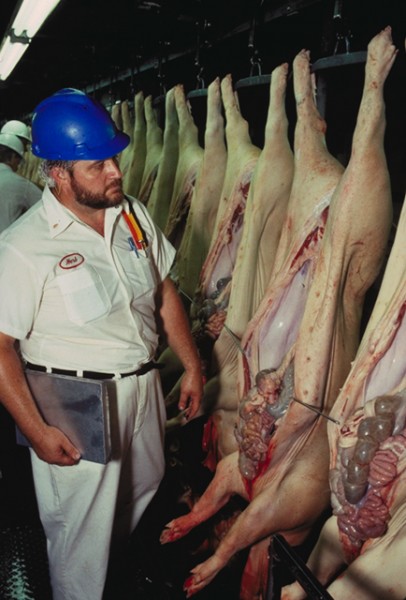
A USDA inspector reviews the carcasses of slaughtered pigs for our safety. Credit: Wikmedia Commons
“As long as there are slaughterhouses there will be battlefields.” –Leo Tolstoy
“We are the living graves of murdered beasts
slaughtered to satisfy our appetites.
We never pause to wonder at our feasts,
if animals, like men, can possibly have rights.
We pray on Sundays that we may have light,
to guide our footsteps on the path we tread.
We’re sick of war, we do not want to fight –
The thought of it now fills our hearts with dread,
and yet – we gorge ourselves upon the dead.
Like carrion crows we live and feed on meat,
regardless of the suffering and pain
we cause by doing so, if thus we treat
defenseless animals for sport or gain
how can we hope in this world to attain
the PEACE we say we are so anxious for.
We pray for it o’er hecatombs of slain,
to God, while outraging the moral law,
thus cruelty begets its offspring – WAR.”
–George Bernard Shaw
Feedback Welcome
Link:
https://dannyman.toldme.com/2013/11/16/test-of-android-voice-dictation/
In honor of Benjy Feen, a test of Android’s speech-to-text capability:
| Original Text |
Transcribed Text |
|
We were somewhere around Barstow on the edge of the desert when the drugs began to take hold. I remember saying something like “I feel a bit lightheaded; maybe you should drive….” And suddenly there was a terrible roar all around us and the sky was full of what looked like huge bats, all swooping and screeching and diving around the car, which was going about a hundred miles an hour with the top down to Las Vegas. And a voice was screaming “Holy Jesus! What are these goddamn animals?”
Then it was quiet again. My attorney had taken his shirt off and was pouring beer on his chest, to facilitate the tanning process. “What the hell are you yelling about?” he muttered, staring up at the sun with his eyes closed and covered with wraparound Spanish sunglasses. “Never mind,” I said. “It’s your turn to drive.” I hit the brakes and aimed the Great Red Shark toward the shoulder of the highway. No point mentioning those bats, I thought. The poor bastard will see them soon enough.
|
We were somewhere around Barstow on the edge of the desert with a drug against a cold. I remember saying something like “I feel a bit lightheaded maybe you should drive.” And suddenly there was a terrible rawr all around us in the sky was full of it look like you’re fat, also reach me on the car, which was going about a hundred miles an hour with the top down to Las Vegas. And waste of screaming “All ages! What are these god damn animals?”
It was quiet again. I turn into taking your shirt off was pouring beer ice chest, to the Celtic the tanning process. “What the hell are you yelling about?” he muttered, staring up at the Sun with his eyes closed and covered with wraparound Spanish sunglasses. “Nevermind,” I said. “It’s your turn to drive.” I hit the brakes and emigrate red truck with the shoulder of the highway. No point missing those bats, I thought. The poor bastard will see them soon enough.
|
I added the quotation marks manually, as well as the paragraph break. My phone, unlike others, does not seem to understand the “new paragraph” command. The original text, was stolen from http://www.galleries.com/jeff/gonzo.htm, which was stolen from Hunter S. Thompson, who is dead.
Feedback Welcome
Link:
https://dannyman.toldme.com/2013/08/06/dannyscript/
Thanks to a tip from kk.org, I recently had the fun of “building” a custom hand-written font, using PaintFont.com.
Four score and seven years ago, our fathers set forth upon this continent a new nation. One conceived in Liberty and dedicated to the proposition that All Men are Created Equal.
My regular handwriting is pretty awful. But this font is somewhat more readable. The process is you pick out the characters you’ll want in your alphabet, download and print some templates, write in the squares on the templates, scan and upload and boom, you’ve got your font. Kind of fun.
Of course, nothing’s ever quite simple. I wrestled at first with the limitations of MyScriptFont.com and a ball-point pen. That first site doesn’t do “double-quotes”. To get the font as far as I have, I also needed to use a felt pen, which is weird for me, and then review the scanned pages in a paint program to eliminate stray marks and cut the bottom tail off my capital I.
I’m pretty pleased with the results thus far. I have to use a larger size for legibility. One nice feature about the PaintFont site is that you can later add characters to your existing font file. If I ever have occasion to employ this font for a “serious” endeavor, I may try to re-render some of the characters for better legibility.
In testing a handwritten font, I find that writing out a few addresses seems to be a good test. Not only do they have a good mixture of letter casing and numbers, but that’s pretty much all I have occasion to handwrite any more anyway:
Jake & Elwood Blues
1060 W Addison St.
Chicago, IL 60613
President Obama
1600 Pennsylvania Ave NW
Washington, DC 20500
The Honorable Mike Honda
2001 Gateway Place
Suite 670W
San Jose, CA 95110
I’m not sure when this will be useful, but it is nice to have your very own font around, and the process is kind of fun. :)
Feedback Welcome
Link:
https://dannyman.toldme.com/2012/12/17/happy-cat/
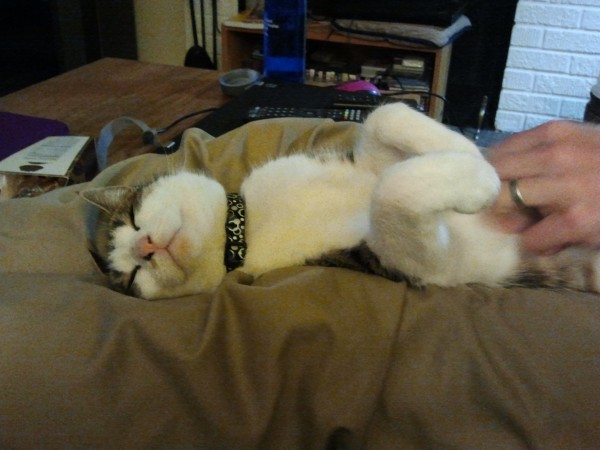
Maxwell smiles during a belly rub.
Feedback Welcome
Link:
https://dannyman.toldme.com/2012/08/14/liberty-dime/
We recently purchased a home, which was originally built in 1948. I was just puttering in the back yard when I discovered a sheared metal post in a cement foundation. I figured I would dig the post out. This wasn’t easy but it was gratifying. At the end I had a 1′ deep hole in my back yard and some angry ants. I saw what looked like a white button at the bottom of the hole.
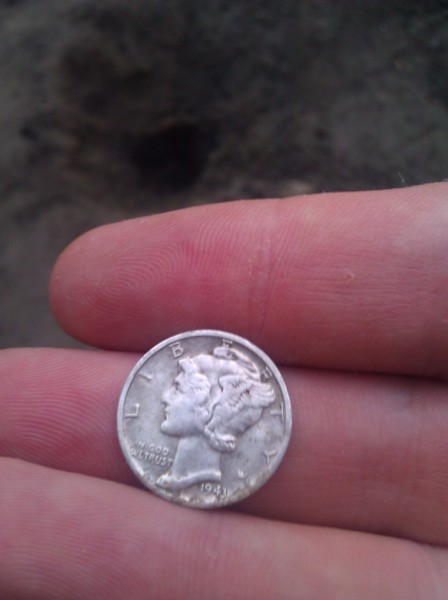
A silver “Mercury” dime from 1943, which I just found in my yard.
After cleaning it off, I found that it was a 1943 US dime, with a bust of MercuryLiberty. Neat! I’m not sure what purpose the metal post must have served, (I reckon it was the base of a clothes line) but it must have been installed around the time the house was built.
I have to wonder if whomever dug the original hole left this souvenier to the future on purpose, or if the dime just slid out of his pocket.
Correction: per Wikipedia, this isn’t Mercury, God of commerce, but “the mythological goddess Liberty wearing a Phrygian cap, a classic Western symbol of liberty and freedom, with its wings intended to symbolize freedom of thought”
1 Comment
Link:
https://dannyman.toldme.com/2012/06/22/snooze/
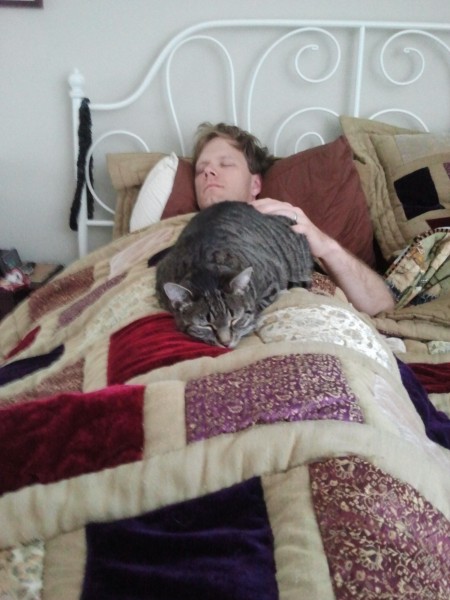
A quiet morning with Maggie.
Feedback Welcome
Older Stuff »
Site Archive













